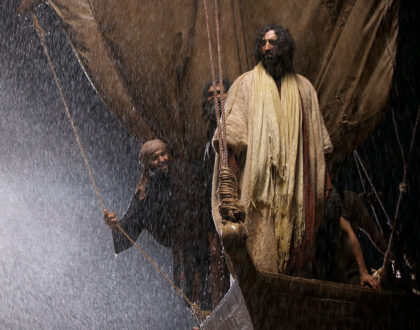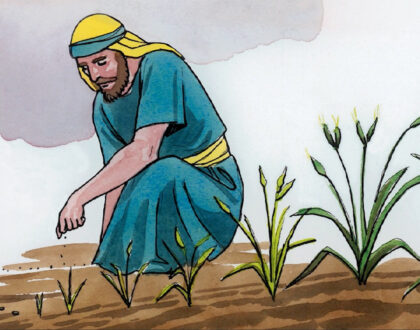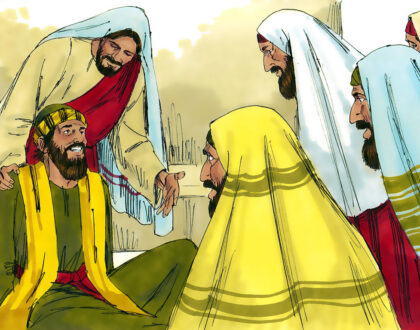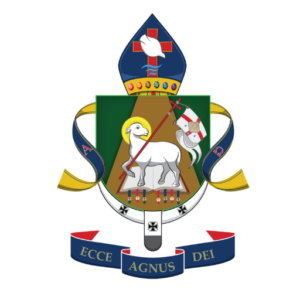He Bore Our Griefs and Carried Our Sorrows
“He Bore Our Griefs and Carried Our Sorrows”
Archbishop Loren Thomas Hines
Palm Sunday
March 20, 2016
Readings: Isaiah 52:13-53:12, Psalm 22:1-11
Philippians 2:5-11
Luke 19:28-44
Today we re-live the triumphant entry of Christ into Jerusalem. This is the beginning of Holy Week, a chain of events that will bring to fulfillment the salvation of all mankind. The love demonstrated by God thru Christ on this Holy Week is not human but divine. On this week, Christ already knew that the completion of His work was at hand.
Some see this week as vacation, spending it to go to the beach or some other place, instead of using this time to dwell on what God did for man and realizing the value that this gift brings into our lives. There was a time when business establishments were closed for the Holy Week. Everything stopped so that the people could focus on the significance of the week; on what God did for man this week. Not anymore. It seems that man no longer honors what God has done. A time may come when even work will continue on these holy days.
Isaiah 52:13 says “Behold, My servant will prosper. He will be high and lifted up and greatly exalted.” Even if He faced pain and sorrow, in the end Christ was exalted as King of kings and Lord of lords. Isaiah says that Christ will suffer when He gives up His “heavenly form” to take on flesh. Most Christians see the cross as their deliverance from sin as “He who knew no sin became sin on our behalf”; but there’s so much more that Isaiah wants us to understand.
When man fell in the Garden, the enemy brought pain and sorrow, sickness and disease, and death upon mankind. Christ went to the cross not just to take away our sin but also to deliver us from pain and all the consequences of sin. He bore our griefs and carried our sorrows (verse 4). Grief covers sickness, sorrow and pain. He delivered us from the pain that sin brings. “By His scourging we are healed.” He took upon Himself our sentence of death for our rebellion. He took upon Himself ALL of our weaknesses. He paid the price for our deliverance so that we may have new life; the old (life) has passed away. So why do we still allow the old life to rule us? When we do this, we reject our deliverance and the new life Christ gave us.
The last thing to be conquered is death. This was the last thing Christ faced, but even this He conquered when He rose again on Easter Sunday. Christ embraced humility. He was God but He humbled Himself when He took on flesh that He might take upon Himself our sins. He had to become man to do that. He became hungry, tired and weary, and needed to sleep just like us. While praying in the Garden of Gethsemane, He showed His humanity when He asked the Father, “If it’s possible, take this cup away….” So great was His anxiety because He would take upon Himself the sin of humanity. He bore all of it. In His humanity, it was more than He could handle; He sweat blood. Yet in humility, He bowed to God. “Not My will but Yours be done.” Christ said, “Not My will but Yours be done”, and at that point, the angels came to strengthen Him to complete His task. Philippians 2:5 exhorts us to “have the attitude in yourselves which was also in Christ Jesus”. Like Christ, we must bow to the Father’s will; then the angels will come to give us the strength and assist us in fulfilling the task God has given us.
We are challenged to look at this week with understanding in our hearts. Christ humbled Himself: He arrived in a manger even if He was God. He came to take on our weaknesses. He left this world in shame, crucified on a cross, naked, exposing all that He was because He was giving all that He was.
Day by day this week, we see what He had to go through; what He did in order to complete His mission. He knew what He was facing when he asked His disciples to get a colt. A colt is a new-born donkey. Because it is not yet fully mature, it is usually found with its mother. A colt and its mother are always together. When the Lord asked His disciples to get Him a colt, there was no way that the colt would go with them, so the donkey had to come along. The Lord chose to ride on the colt, so its mother/the donkey followed. There is a significance in this because everything that the Lord did had meaning. A donkey is very stubborn. Possibly, the donkey represents Israel and the colt, the Gentiles. The Jews were rejecting Him, so the Lord turned to the Gentiles, the “babies” in the faith.
Zechariah 9:9 prophesied the manner of the Lord’s entry into Jerusalem. “Behold, your King is coming to you….humble and mounted on a donkey, even on a colt, the foal of a donkey.” He rode to Jerusalem on this day that we now commemorate as Palm Sunday, as a King; yet He rode on a colt of a donkey, the lowest form. Still, the people declared Him King. Palm branches and clothes were thrown on His path. As He approached Jerusalem, He wept as He saw everything that God has done for them yet they continued to reject Him (Luke 19:41-44).
As the Lord approached Jerusalem, “the whole crowd of the disciples began to praise God joyfully with a loud voice for all the miracles which they had seen, shouting, ‘Blessed is the King who comes in the Name of the Lord….” Some of the Pharisees in the crowd asked the Lord to rebuke His disciples for what they were proclaiming so loudly. To this, the Lord replied, “I tell you, if these become silent, the stones will cry out”.
In my travels, I have seen the Cathedrals in Europe and these are massive structures. The one in Koln, Germany took 900 years to build. Yet today, these cathedrals are empty. In France, the churches are government-owned. These cathedrals have become tourist attractions, amazing tourists with the thought that these massive structures were built by men with their own hands. One of my favorites is Mount Saint Michel off the coast of Normandy in France. This cathedral was built on a rock and the rocks used on this cathedral came from another mountain. Somewhere inside the cathedral is a large wheel which they used as a machine; men would walk on this wheel to transport the rocks that were used to build the cathedral. Everything was done by hand. The Lord said that the day will come when people will forget Him, and on that day, the rocks will praise Him. These cathedrals now stand in praise of the greatness of God working through the men who built them. They have become tourist attractions because people are awed by what men of old created and built with their own hands.
Isaiah tells us that not only did Christ take away our sins, but also our grief, sorrow, sickness, and pain. We have to renew our mind so we may realize what God has done for us and begin to live out the new life He gave us. It’s time for the Church to wake up. The world is being shaken by recent events. The United States has turned against God; as a result, they are now going through major conflicts. One wonders if it will be able to stand.
Let us go through this week reflecting on what Christ has done for us. He suffered so we won’t have to go through the same suffering; that come Easter, we may have new life. The problems we’re facing today are not meant to destroy us but to build us up. It’s time that we live this new life that Christ has given us.
Recent Sermons

Jesus, Calmer Of Storms
June 23, 2024

Harvest Time Stemming From The Smallest Seed
June 17, 2024

Not Bound By Limitations To Minister
June 10, 2024

